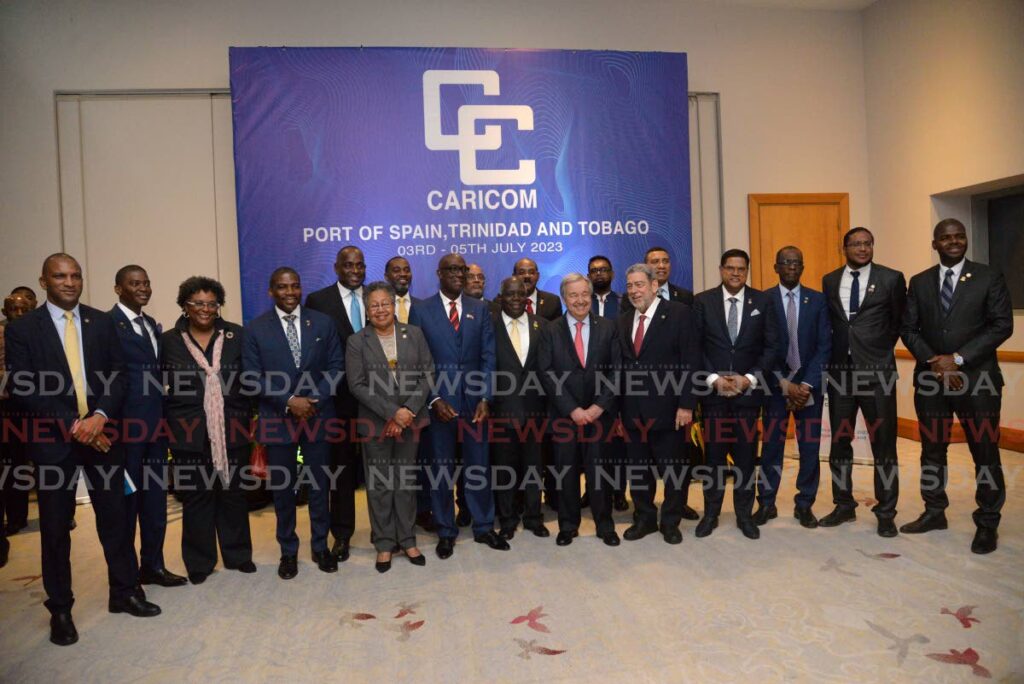Best wishes, hopes as Caricom marks 50 years

KIRAN MAHARAJ
As we emerge from one of the world’s most trying times, the pandemic, the significance of integration in our region is evident.
As Caricom celebrates 50 years and several milestones, the TT Chamber of Industry and Commerce acknowledges the strength and resilience of Caricom.
We also salute the Caricom private sector organisation in its ongoing efforts to advance private sector participation in our region.
With a vision rooted in its four main pillars of economic integration; foreign policy co-ordination; human and social development; and security, the progress made via collaboration and co-operation is a model of the power of potential.
We applaud the ideals and achievements to date.
We celebrate the initiatives which have emerged out of Caricom, including the Caribbean Public Health Agency (CARPHA), the Caribbean Development Bank (CDB), the Caribbean Court of Justice (CCJ), the Caribbean Disaster Emergency Management Agency (CDEMA) and the Caribbean Examinations Council (CXC).
These outcomes are the result of strategic objectives developed from a determination to ensure our region’s people not only benefit, but also have our own space on the world stage.
We salute the countries, their leadership, and the business pioneers who over the past 50 years, understood the necessity for a Caribbean community.
The next 50 years can be viewed as a revitalisation as the region refocuses on renewable resources, the development of the digital economy, the necessity for food security and the existential threats that loom with climate change. The issues at play will require critical thinking towards strategic direction aimed at ensuring our survival as a region, as well as support from the private sector to ensure that Caricom itself can scale up.
Food security must remain a key priority.
According to the Inter-American Institute for Co-operation on Agriculture (IICA, April 2021), “The covid19 pandemic has exacerbated existing inequalities across the board. There are now 2.7 million food-insecure people in the English-speaking Caribbean. The burden is disproportionately felt by low-income households: 68 per cent reduced their food consumption.”
There have been periods of what can only be considered stagnation in growth opportunities, despite the Revised Treaty of Chaguaramas (2001). As with most things which require enforcement, there must be political will. The CSME (Caribbean Single Market Economy) mechanism of the removal of trade barriers, implementing a common external tariff on goods entering the region from outside, along with the right to establishment, are still elusive. The challenges faced in the day-to-day operations within the region can be remedied with the technology available now, as an enabling advantage which did not exist 50 years ago.

The region’s attempts at diversification have not been sufficiently intertwined with the notion of Caribbean integration to make it a formidable trade bloc with bargaining power. There is capacity to provide attractive business opportunities with potential to make us globally competitive – the creative arts sector, entrepreneurship hubs, cyberspace start-ups, and venture-capital initiatives.
The lack of data to inform decision-making, gain insights into trends and allow for future projection and planning is also a bugbear which should be urgently addressed.
Among its member states there are many hidden opportunities for synergy and improved integration. Upon examination of country-by-country initiatives, it is evident that there is duplication of strategies, which might also mean expenditures that can be avoided if we act in synchronicity. Cluster-mapping of our products and services within a business viability matrix can indicate the effective utilisation of resources and create improved operational efficiency within the region while allowing holistic oversight of how entry into new markets can best be accomplished.
As the private sector adapts and evolves, there is also an opportunity for best-practice development within the region across multiple sectors. The collaboration and documentation of these should better define key learnings and benchmarks from a generic perspective, but also against our cultural backdrop. We cannot deny that we are bound most closely by our past and that our resilience is a reflection of the tenacity of our pioneers and leaders. There are lessons embedded in our history and in our current mode of adaptation and operation.
Our people are where we also need to progress: "It takes a village to raise a child" is true.
We should re-examine the education system for our youth and provide better options for the development of technical skills at all levels of education. Incentives for specific job areas also need to be created so we have a labour force within the region which meets the requirements and can fulfil the opportunities that exist.
The private sector has had difficulty harnessing the human resources required to enhance its business operations effectively.
The existence of non-governmental organisations indicates the voids in our social infrastructure which need to be filled. These entities are necessary stakeholders, and their experiences are significant as a well of information which can better direct the approach needed to repair our society and create prosperous communities. A co-ordinated approach to tap into this well is lacking.
Crime is the disease that plagues us.
The region is at a crossroads where survival will depend heavily on a redefined view of security. The issues can best be described as a Rubik’s Cube of interlocking elements which need to be addressed within the context of existing alliances with partners who defend democracy, Caricom agendas and national mandates via multi-strategy approaches. Transnational crime exists, but internal security threats, with new, regional threats, combine into what can be considered existentialist threats unless proactive long-term measures are implemented and in which the reinvention of economies and social well-being of citizens are the foundation of this new normal. It means a "defragging" to secure a safe future and move towards Caribbean sustainability.
Caricom’s fiftieth anniversary is an accomplishment for Caribbean citizens and there is significant potential.
The TT Chamber of Industry and Commerce reiterates our commitment to persevering towards a country and regional community that are prosperous for all.
This article was contributed by Kiran Maharaj, president of the TT Chamber of Industry and Commerce.


Comments
"Best wishes, hopes as Caricom marks 50 years"